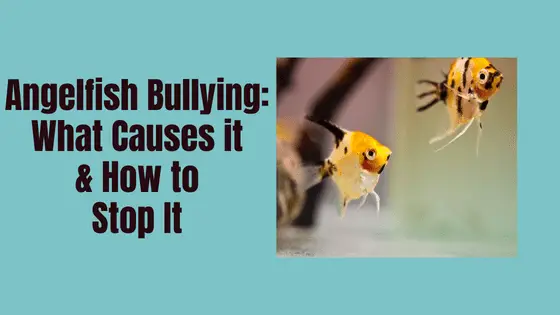A community tank is one of the most satisfying aspects of keeping fish, as it allows you to see different types of fish all living together in peace…well, most of the time, anyway!
There can be a downside to having a community tank. Sometimes trouble brews between different species, or within a species.
There is a way to virtually eliminate this, which is to do your research before adding a new type of fish to your tank. This way, you will spend less time worrying over the stress levels of your fish kids, and more time enjoying how they all get along peacefully together.
In this article, I’m going to discuss angelfish bullying: what are the causes of it, and what can be done to stop it.
Do Angelfish Bully Other Fish?
Angelfish have been known to bully other fish. This usually tends to be other angelfish and there is nearly always a reason for it, like establishing a pecking order. overcrowding, no shelter, incorrect male to female ratio or not enough fish in your tank.
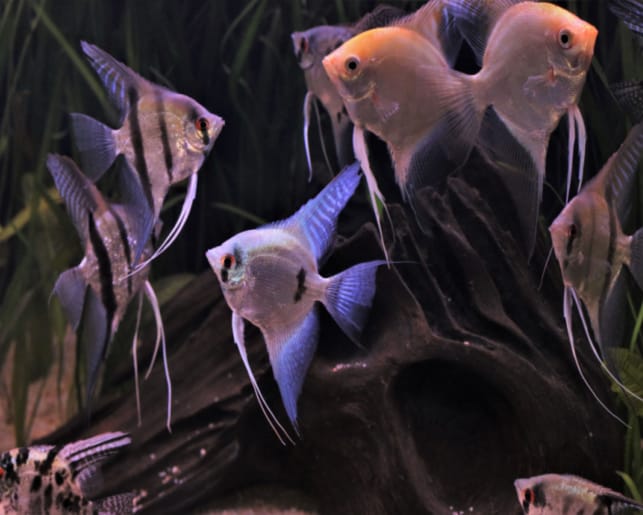
Reasons Why Angelfish May Bully Other Fish.
They are establishing a pecking order.
This is relatively normal behaviour with angelfish if you have more than one male. The group needs to establish who is the boss and who isn’t. This is usually decided by very low level aggression, which can often be mistaken for playing. It can get a bit more aggressive if one of the males refuses to back down though.
Not enough space.
Angelfish need plenty of space to swim, as well as quite a tall tank so they have plenty of space both above and below them due to their shape.
Use a stocking calculator, like AQADVISOR.COM to help you work it out. They take the shape of your tank into consideration, as well as the size.
Not enough food.
It’s not just humans that get hangry. A hungry fish can be a very aggressive fish. Not feeding your fish enough is as bad as overfeeding them. Getting the amount right for your tank can take a few goes to get correct, but it is very important.
They are in spawning condition.
When male angelfish are in spawning condition, they will have a go at the other males if they annoy them. The male’s temperature increases when they are ready to spawn, and we all get a bit irritated when we’re too hot, don’t we? The male will basically chase his female partner constantly when they are getting ready to spawn. It can look like he is looking for a fight, but if you look closely at the other fish, you should see she has a more rounded belly than normal.
Not leaving the ladies alone.
When they are in spawning condition, the male will constantly chase his female mate around in quite an aggressive manner. Angelfish are not only prolific breeders, they are loyal partners as well. A mated pair of angelfish will stay together for life, unless there are some trust issues (no, I am not joking).
Female angelfish prefer the more aggressive males as they think that will make them a more protective parent to their fry when hatched.
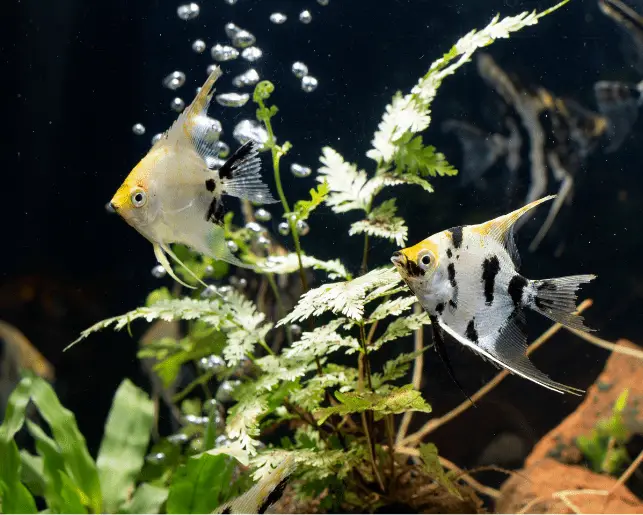
How do Angelfish Show Aggression?
There are other reasons why angelfish look like they are showing signs of aggression, when in fact, it is not as bad as it looks.
Sparring.
Sparring amongst angelfish is very common when they are in a group with more than one male. This is how they sort out their pecking order. The 2 sparring fish will basically chase each other around the tank. If you watch closely, you will see the same 2 fish chasing each other constantly. They will repeat this until they get bored (or distracted), or until one of them finally backs down.. This will be very obvious if you were to add a new male angelfish into an already established group.
Mating.
When angelfish are mating, you could be mistaken for thinking they are actually fighting, as it looks very similar to when they are being aggressive to each other.
It is quite difficult to tell the difference between a male and female angelfish as they are both the same shape and colour, You can usually tell by their behaviour as the males are always the more aggressive ones.
There is another way to tell which of your angelfish are females, which is by looking for a little bump next to their breeding tubes, just like in the photo below.
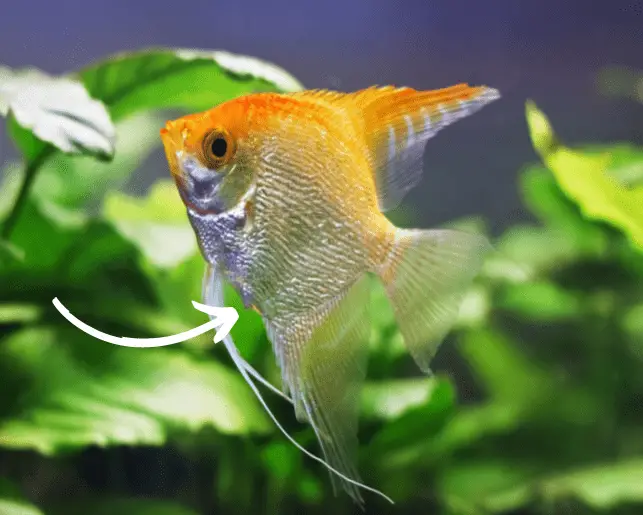
Here are a few things for you to look out for to help you decide if your fish in being bullied by another angelfish.
Signs of Angelfish Bullying:
- Damaged fins
- One of your fish staying away from the rest of the group
- A fish hiding away a lot
- Not eating
- Swimming in an unusual manner-they could be injured
How to Reduce Angelfish Bullying.
Correct male to female ratio.
I would always recommend having your male to female ratio as 1 male to every 1 female. This will stop the females from being harassed by the males before they partner up for the first time.
It is also a good idea to not have too many male angelfish in your tank. This will help to reduce aggression between them.
If you are not interested in breeding, you may want to consider an all female angelfish group, as this will virtually eliminate any bullying.
Correct tank size.
This is essential no matter what breeds of fish you have. One of the main reasons why fish get stressed is because they don’t have enough space. This can result in fish hiding away, or fighting with their own type, or other breeds, because they feel trapped.
Always make sure you don’t overstock your tank. When calculating how many fish can fit into your tank, you have to calculate using their adult size, not the size they currently are. Always try and understock slightly to be on the safe side.
As well as considering the size of your tank, you also need to think about the shape of it as well. This is essential when it comes to fish like angelfish, who are one of the most active fish to put in your tank. They need plenty of swimming space, both above and below them, due to their elongated shape.
Have hiding places.
Having some ornaments and plants in your tank is always a good idea as it creates shelter, as well as places of interest. You don’t have to have real plants either, the imitation ones do their job in providing shelter or hiding places for fish for when they need to just have a moment to themselves.
Fish can feel exposed when in a stressful situation so it is good to have somewhere for them to retreat to. Having a hiding place or a bit of shelter makes the fish feel a lot safer. It also provides a distraction for any bullying fish as the other fish are not always in their line of vision.
Just always make sure that you don’t fill your tank up with so many things that your fish have no room to swim and have fun, as that can be just as stressful as having nowhere to hide.
Keep the correct number of Angelfish.
There is an unofficial rule of thumb between keepers of angelfish, which is to have either one, two or six of them in your tank. If you only have one, they can’t get into too much trouble. Getting an already established pair is fairly easy to take on, then 6 all at the same time will mean any problems will be more spread out. Just don’t have 6 males or you will be asking for trouble. Don’t have too many more in your tank (unless your tank is massive) because that can lead to aggression over hierarchy.

Feed them the correct amount.
When you are new to fishkeeping, you are always told that you should never overfeed your fish. It is just as important that you don’t underfeed them as well, as that can also have a damaging effect in your tank.
Hungry fish can be aggressive fish as they may have to race to get to the food first if you aren’t feeding them enough.
It really is a case of trial and error at first when it comes to feeding your fish the correct amount.
A rule of thumb is that all the food you feed your fish should be eaten within 3 minutes. If your fish finish eating everything well within that time, you are not feeding them enough. If, after three minutes, there is still a lot of food floating around the tank, you are feeding them too much, so remember to adjust what you give them the next time you feed them.
Get your timing right.
It is best to add your danios to the tank at the same time, and preferably when they are juvenile.
This may sound like an obvious thing but make sure your angelfish all look healthy when picking them at your local aquarium. A sick fish, or a fish noticeably smaller than its fellow angelfish is always a prime target for bullying.
If you were to add angelfish to a tank that already has some in it, this is likely to cause a problem. The fish in the tank will already have sorted out their pecking order so could be a bit miffed at new guys being added. If you only added female angelfish at a later date, there shouldn’t be a problem.
Best Tank Mates for Angelfish.
A popular choice of tankmate for angelfish are corydoras. They tend to just hang out in their own little group, at the bottom of the tank, so won’t be freaked out by all the movement in the tank.
Don’t add anything very small in as the angelfish will see them as lunch. Also, keep away from any fish notorious for fin nipping. Now, I know this is a bit ironic as angelfish are masters at it, but, they do have a lot of long, flowing fins that can be nipped very easily. I would avoid tiger barbs and a few of the tetra and gourami species as well for this reason.
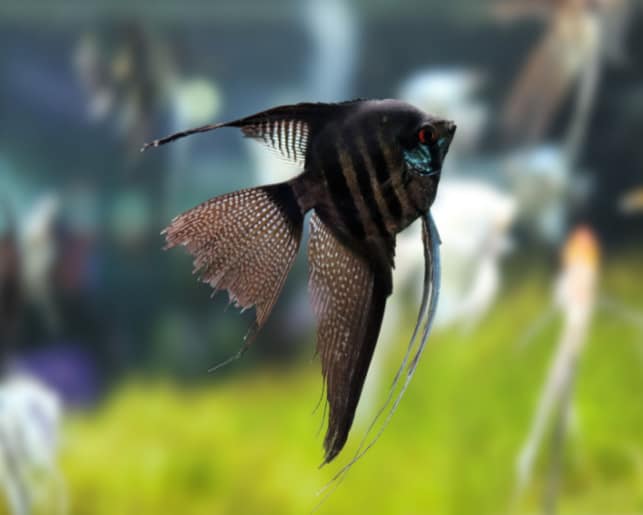
Conclusion.
Angelfish make a great visual addition to a community tank due to their unusual shape and lovely markings, but bullying between them can occur due to their general feistiness. However, there is nearly always a reason for this, and there are ways to prevent it from becoming a problem.

